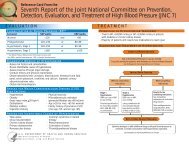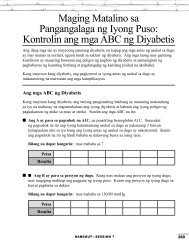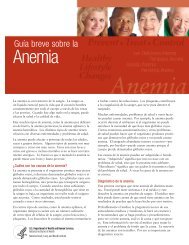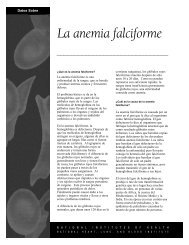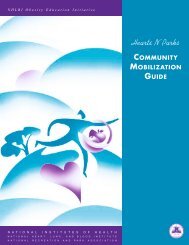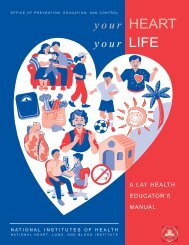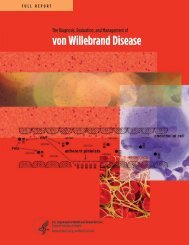WOMEN 'S HEALTH AND MENOPAUSE : - National Heart, Lung ...
WOMEN 'S HEALTH AND MENOPAUSE : - National Heart, Lung ...
WOMEN 'S HEALTH AND MENOPAUSE : - National Heart, Lung ...
You also want an ePaper? Increase the reach of your titles
YUMPU automatically turns print PDFs into web optimized ePapers that Google loves.
Data on the relation between skeletal BMD and<br />
tooth loss are not yet available from the described<br />
WHI cohort, but other studies have examined this<br />
issue. The Study for Osteoporotic Fractures<br />
Research Group reported an association between<br />
tooth loss and the rate of systemic bone loss<br />
among 4,524 U.S. women age > 65 who reported<br />
being dentate at baseline and who returned approximately<br />
5.7 years later for a followup visit. On<br />
adjustment for age, weight, use of estrogen, and<br />
smoking status, it was found that women reporting<br />
tooth loss had higher annual decreases in hip BMD<br />
than women who did not lose teeth (0.68 percent<br />
versus 0.54 percent, p < 0.0029). 132<br />
7.3 Approaches to Therapy<br />
Bone regenerative procedures, such as guided tissue<br />
regeneration and grafting, have already<br />
become commonplace for treatment of localized<br />
oral bony defects, and their use is likely to expand.<br />
State-of-the-art treatment for tooth loss focuses on<br />
the placement of single or multiple teeth implants;<br />
this approach, too, is<br />
gaining wide acceptance.<br />
Long-term studies<br />
are underway to<br />
evaluate the effect of<br />
antibiotics on progressive<br />
oral bone loss.<br />
Another promising<br />
area of research is the use of NSAIDs133 and bisphosphonates134<br />
There are several important<br />
clinical implications of an<br />
association between oral<br />
status and skeletal status.<br />
to control host inflammatory<br />
and/or bone resorptive responses.<br />
Given the data relating oral bone loss and osteoporosis,<br />
it has been hypothesized that treatments<br />
used to maintain or improve skeletal bone density<br />
may favorably affect oral bone status and tooth<br />
loss. Two large cohort studies have examined the<br />
effect of HRT on reported tooth loss. 135,136 Analysis<br />
of data on 48,483 participants in the Nurses’<br />
Health Study in the United States 136 showed that<br />
among women who reported regular dental visits<br />
there was an inverse relation between current hormone<br />
use and loss of teeth after controlling for age<br />
194<br />
and cigarette smoking. Among the 3,921 women in<br />
the Leisure World Cohort Study who provided<br />
suitable data with which to assess tooth status,<br />
estrogen users had significantly lower age-adjusted<br />
tooth loss and edentulism rates compared with<br />
nonusers. 111 Studies of the effect of other boneenhancing<br />
agents on tooth loss have been limited,<br />
but some trials have demonstrated positive findings.<br />
Data obtained from women with normal<br />
spine densities enrolled in a randomized nutritional<br />
intervention trial indicate that a smaller proportion<br />
of women taking calcium supplements reported<br />
tooth loss compared with those taking placebo. 137 A<br />
pilot trial has provided evidence of a lower RR for<br />
progressive oral bone loss among alendronatetreated<br />
participants than in placebo controls. 138<br />
7.4 Clinical Perspective on Oral Bone Loss<br />
There are several important clinical implications of<br />
an association between oral status and skeletal status.<br />
On one side of the issue, it is possible that oral<br />
examination and radiographic findings may be useful<br />
signs of extra-oral bone diminution. Although<br />
preliminary studies along these lines have yielded<br />
promising findings, it is too early to know the<br />
value of routine dental visit information in signaling<br />
the need for skeletal bone evaluations. 139 On<br />
the other side, history of skeletal osteopenia may<br />
impact the need for, and outcome of, a variety of<br />
periodontal and prosthetic procedures including<br />
guided tissue regeneration and tooth implantations.<br />
If therapy for skeletal bone conditions is undertaken<br />
and is successful, the oral cavity may reap benefits<br />
as well.<br />
A connection between menopausal estrogen deficiency<br />
and oral bone loss is biologically plausible,<br />
and many research findings to date are consistent<br />
with that link. More research is needed to contextualize<br />
the relation fully and to understand the<br />
extent to which menopause increases a woman’s<br />
oral health risks. Even as we await more detailed<br />
information, women and their health care<br />
providers are advised to incorporate oral health<br />
into the menopausal conceptual milieu.



